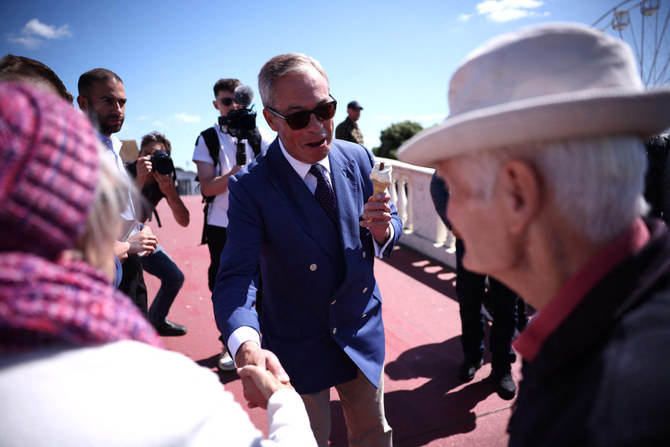LONDON: Brexit figurehead Nigel Farage has claimed to have kickstarted a “revolt against the establishment,” after exit polls indicated his hard-right party had secured an unprecedented electoral breakthrough.
Reform UK, a re-brand of the Brexit Party that Farage founded in 2018, were predicted to secure 13 seats — the first time a party on Britain’s far-right fringes has won more than a single seat.
“This, folks, is huge,” Farage said in a social media video posted early Friday.
“The revolt against the establishment is underway,” he added on X.
Reform appeared to have far exceed expectations in the election, after it was forecast in the latter stages of the campaign to win just a handful of seats in the House of Commons.
Farage, who launched an eighth bid to become one of the country’s 650 MPs mid-way through the six-week campaign, was set to succeed finally in Clacton, eastern England, according to the exit poll for UK broadcasters.
This would put the attention-grabbing populist figurehead in a prime position to attempt his long-term aim of staging a “takeover” of the Conservatives.
Millions of their voters appeared to have already switched their support to Reform, leaving the Tories — in power since 2010 — facing their worst result in nearly two centuries, the exit polls said.
Reform’s surge comes as hard-right parties or politicians increase their appeal across Europe and in the United States.

Seen as one of Britain’s most effective communicators and campaigners, Farage — a privately educated son of a stockbroker — is a long-time ally of US President Donald Trump.
“This is the beginning of a big movement,” David Bull, Reform’s deputy leader told Sky News, as the UK awaited the official tallies late Thursday.
“This is a political revolt. It’s also a five-year plan. If we can go from nothing four years ago to winning 13 seats, imagine what we can do in five years’ time.”
Farage, 60, is a one-time Conservative who quit the party in the early 1990s to co-found the euroskeptic UK Independence Party (UKIP).
He pulled off an unprecedented win in the 2014 European Parliament elections, serving as an MEP for the fringe party for around two decades and helping to make Euroskepticism more mainstream.
But UKIP never managed to win more than one seat in a general election. Farage himself failed to become an MP on seven separate occasions.
But his national prominence continued to grow after he became a driving force behind the 2016 Brexit vote, before forging a career as a presenter on the brash right-wing TV channel GB News.
Entering the 2024 general election after initially ruling himself out, Farage said he was bidding to emulate efforts in Canada in the 1990s by right-wing fringes to take over its Conservative Party.
His candidacy dramatically re-energised Reform UK, while spooking the Tories as polls immediately registered an uptick in support for the hard-right anti-immigrant outfit.
Conservatives and centrists now fear Farage could have the perfect platform in parliament to further legitimize his staunchly anti-establishment populist messaging.
“If this exit poll is right, this feels like Nigel Farage’s dream scenario — he’ll be rubbing his hands with glee,” said Chris Hopkins, political research director at pollster Savanta.
“He’s got enough MPs to make a racket in Westminster, and the party he shares the closest political space with could be reduced to a long period of soul-searching.”























